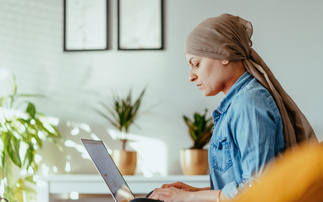Mental wellbeing scores have dropped significantly across a number of key metrics, data shows
A recent report from digital mental health tech firm 87% has revealed the mental health impact of the coronavirus pandemic on its users.
By taking a score across seven key life areas, the platform allows individuals as well as employers to monitor mental wellbeing, then take steps to make adjustments and issue guidance where it may be required.
After crunching data from its thousands of users, many of them working on the medical frontline for organisations like the Royal College of Emergency Medicine and Air Ambulances UK, 87% found that mental wellbeing scores have dropped significantly across a number of key metrics including anxiety, fatigue, isolation and work stress, demonstrating declining mental health as a general trend.
As many as 43% said it is difficult to feel enthusiastic about much at the moment.
Of particular note is the level of stress being experienced at work last year in line with economic insecurity and uncertainty. According to its recent Mental Wellbeing Report 2020, wellbeing scores in this area dropped by 16.5% from March last year.
Overall scores are currently 15% lower than they were at the same time last year and men aged 36-45 are the worst affected, the report also found.
Lonely and tired
The data also revealed that those aged 18-25 are feeling most isolated, something particularly prevalent for women in this age range, while fatigue has also increased, despite the flexibility of working from home and reduced commuting. 87% suggested this is because people are worrying more.
Across all users, half (47%) report having less energy than usual and women are reporting significantly less energy than men.
As many as 43% said it is difficult to feel enthusiastic about much at the moment.
Prevention
According to Dr Serra Pitts, clinical director of 87% and a member of the British Psychological Society, the data reinforces that, for employers especially, a shift towards prevention is needed.
She said: "These trends are indicative of a broken system that relies on reacting to issues, rather than preventing them. But with advanced technological insights into wellbeing, and measurable data, comes the power to direct appropriate interventions at the right time. 87% provides businesses with a more progressive means of measuring and monitoring employee wellbeing, via clinically-led insights developed by a team of psychologists. This data facilitates fact-based decisions and takes mental health from being reactive to being proactive."
One way of helping individuals address negative thoughts and feelings during the pandemic to help them track their mental wellbeing, Dr Pitts argued.
"As people reflect on their quality of life and their feelings during the pandemic, managing difficult emotions, such as anger, frustration and uncertainty, has become a focus. Users, even those who are mentally fit, have begun to understand that they are having negative thoughts and looking for ways to address these. Physical health and emotional health have also been areas of conscious concern for users as they express a desire to undertake more exercise. This is good news because the benefits of exercise are considered vital for maintaining mental fitness."
She added that businesses need to make wellbeing a priority. "Ensuring a healthy work-life balance and allowing all employees to enjoy uninterrupted personal time will re-energise them. Meanwhile staff will appreciate honest communication about concerns and issues, respecting managers who talk openly and are comfortable with being vulnerable," she said.
"Most importantly, businesses need measures in place that give them accurate insights into how staff are faring. It is encouraging to see our users taking steps to learn healthy habits but this is something that we should all be doing, every day. Only with accurate assessment can we put the right measures in place to build positive mental health over time."
Business as usual?
Some of this data was presented by 87% CEO Andy Bibby during a COVER webinar which took place on Blue Monday (18 January).
Titled 'Business as usual? Mental health and wellbeing in a post-pandemic era', other speakers included Subashini M, associate medical director for Aviva, Rob Stevenson, founder of InsideOut Leaderboard and Sophie Money, group protection wellbeing manager for Aviva.
The hour-long discussion explored the role the protection and health insurance amid an impending mental health crisis, the use of technology and how employers can help employees take responsibility for their mental health, especially now.
If you missed it, don't worry, you can register and watch the full webinar on demand here.













